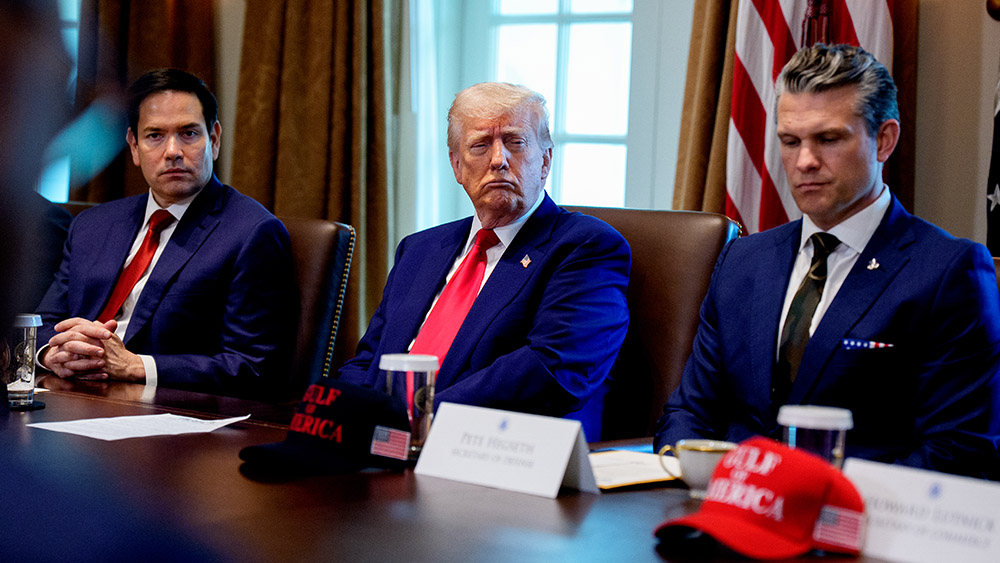 Parler
Parler Gab
Gab
- Catherine Austin Fitts, a former HUD official, claimed that the world's wealthiest individuals have used clandestine government funding to create a secretive "breakaway civilization." This includes subterranean networks, advanced technologies and infrastructure designed to protect them from societal collapse, potentially including global extinction events.
- Fitts argued that the U.S. government's shift towards opaque fiscal policies in the 1990s, leveraging "black budgets" for secret operations, has allowed elites to funnel trillions into projects shielded from public scrutiny and congressional oversight. This system thrives on secrecy, with the public unaware of advanced technologies and infrastructure.
- Fitts described a national network of underground bases connected by high-speed transportation systems and powered by undisclosed energy sources. These facilities, she suggested, are designed to prepare for global catastrophes while maintaining elite control, reflecting a broader agenda of centralized power and global dominion.
- Fitts highlighted how post-Cold War policies expanded black budgets and allowed corporate partners to profit from government projects without transparency. She criticized the prioritization of "Mr. Global" interests over equitable governance, framing events like the 2008 financial crisis as intentional levers to concentrate wealth and power.
- Fitts emphasized the need for transparency amid growing secrecy and centralized control. She urged the public to confront issues like the "missing $21 trillion" in unaccounted federal funds and to recognize the dangers of systems designed to control and herd people into controlled environments.
The alleged “breakaway civilization” and black budgets
Fitts, who left the Bush administration in 1990, posited that the U.S. government’s 1990s pivot toward opaque fiscal policies laid the groundwork for the elite “breakaway civilization” she describes. By leveraging so-called “black budgets” — secret allocations for specialized operations under national security pretexts — she argued elites have funneled trillions into projects shielded from congressional oversight. “They began stealing trillions and built a digital prison to control the population,” Fitts told Carlson, citing what she called systemic financial manipulation, including inflated inflation metrics and global depopulation agendas. She emphasized that this system thrives on secrecy, with the public left unaware of technologies like advanced energy sources or subterranean transportation networks designed to evade scrutiny. Her claims mirror long-standing conspiracy theories but are fortified by her government service, including roles managing HUD’s $40 billion budget. Fitts has consistently criticized Wall Street’s influence over U.S. monetary policy, arguing central banks and the Bank of International Settlements (BIS) — mentioned in the interview — act as enforcers of elite control. According to Fitts, this cabal sees decentralized societies as a liability; crises like 9/11 were framed as justifications for accelerating centralization, though she did not directly tie such events to clandestine plans. “What I’m describing isn’t a hypothetical,” Fitts asserted. “These aren’t people who just want influence. They want control of the planet’s human and natural resources.”Secret networks: Underground bases and end times scenarios
A focal point of the interview was Fitts’ description of a national network of underground bases hidden beneath U.S. cities. These facilities, she claimed, are connected by high-speed transportation systems and powered by unacknowledged energy sources. She suggested they serve dual purposes: preparing for a global catastrophe—such as a pandemic or environmental collapse—while maintaining the elites’ grip on power. “The key to understanding this is to realize that there’s no move without a budget,” she said, agreeing with Carlson’s analogy of elites wanting to control every “human being on Earth.” Fitts linked these infrastructure projects to the 1990s-era militarization of national security institutions, arguing that the rise of “Mr. Global”—a metaphor for policymakers and financiers who prioritize global dominion over national sovereignty — has eroded domestic accountability. “Mr. Global believes popular opinion is too slow to act on certain threats, so they bypass it,” she said, referencing her 2011 writings about elites capitalizing on crisis to rewrite social and economic frameworks.The roots of elite power structures
Fitts’ warnings echo themes from a 2011 interview she gave on “Unpacking Mr. Global,” where she detailed how post-Cold War policies expanded black budgets under the CIA Act and National Security Act. Those statutes, she argued, allowed corporate partners to profit from government projects without transparency. By the 1990s, Fitts suggested, public institutions had begun prioritizing “Mr. Global” interests — such as existential risk mitigation — over equitable governance, fostering a culture of distrust. Her HUD tenure, she noted, provided front-row access to the pivot toward privatized control. “We were told certain questions about funding just couldn’t be answered,” she recalled, framing modern crises like the housing collapse as intentional levers to concentrate wealth. “The 2008 crash was planned, not accidental. It was about redistributing power.”Implications for national security and public trust
Fitts’ claims underscore longstanding concerns among conservatives about federal overreach and elite capture of democratic systems. While her theories—such as secret bases or global depopulation—are dismissed by many as outlandish, critics like radio host Alex Jones have amplified similar lines of inquiry for years. Jonathan D. Tepperman, National Security Adviser to the Bush White House, declined to comment, but experts note institutions like HUD under Bush did face allegations of funneling money to favored contractors—a theme Fitts revisits as part of her larger critique. The interview’s viral success reflects broader discontent: 43% of Americans believe government operates in secret partnerships with elites, per a 2024 Reuters poll. Fitts urged listeners to confront “the missing $21 trillion” in unaccounted federal funds, linking transparency deficits to deepening political polarization. “We’re seeing wake-up calls, like crypto crackdowns or ration programs—systems designed to herd people into controlled environments,” she said, advising audiences to “protect what you can” amid mounting secrecy.A call for transparency amid shadowy global power shifts
Fitts’ appearance on Tucker Carlson’s show underscores the enduring influence of conspiratorial narratives in national discourse. While her claims about clandestine networks remain unverified, they resonate with polls showing widespread skepticism about government operations and financial systems. For conservatives emphasizing limited government, her allegations—if substantiated—would represent an unprecedented betrayal of constitutional principles. Yet even skeptics acknowledge the dilemmas she highlights: as technology and crises concentrate power, how much oversight can citizens demand? Fitts ended by calling the public’s awakening “the only way to survive.” Whether her warnings signal authenticity or alarmism, the interview crystallizes the tension at the heart of modern governance: the battle between transparency and the shadowy forces that profit when the lights are out. Sources for this article include: YourNews.com X.comFossil fuels fall below 50% in U.S. electricity mix for first time
By Willow Tohi // Share
Texas AG Ken Paxton targets fluoride in children’s toothpaste amid health concerns
By Ava Grace // Share
Trump’s defense of tariffs as economic strategy sparks debate over trade and consumer impact
By Willow Tohi // Share
By Finn Heartley // Share
Governments continue to obscure COVID-19 vaccine data amid rising concerns over excess deaths
By patricklewis // Share
Tech giant Microsoft backs EXTINCTION with its support of carbon capture programs
By ramontomeydw // Share
Germany to resume arms exports to Israel despite repeated ceasefire violations
By isabelle // Share










